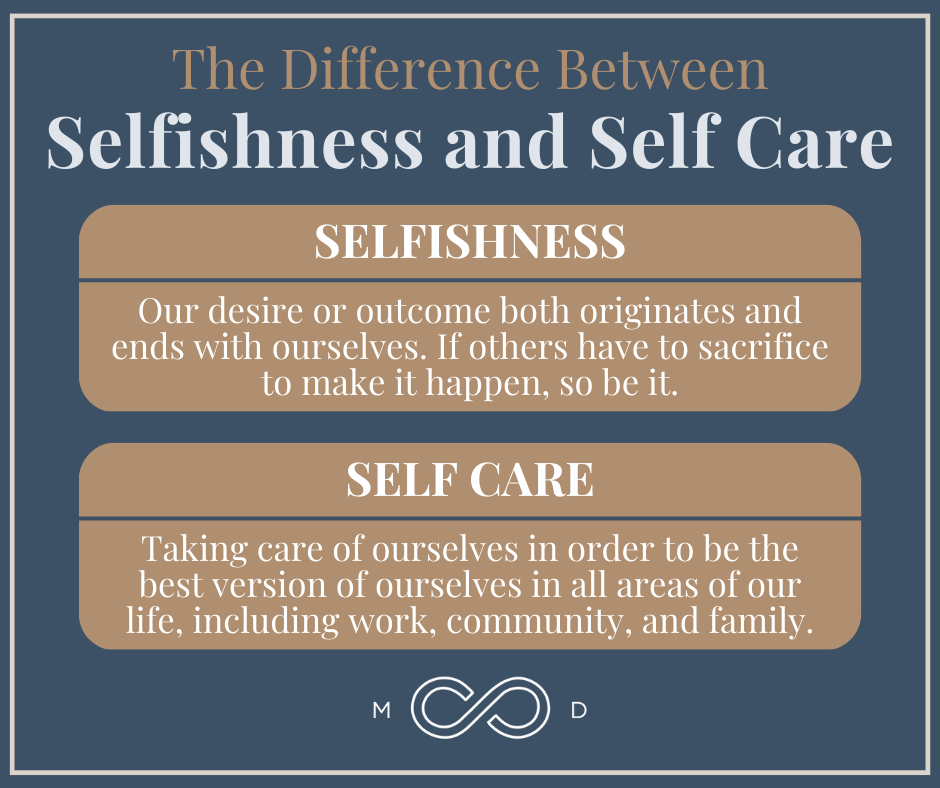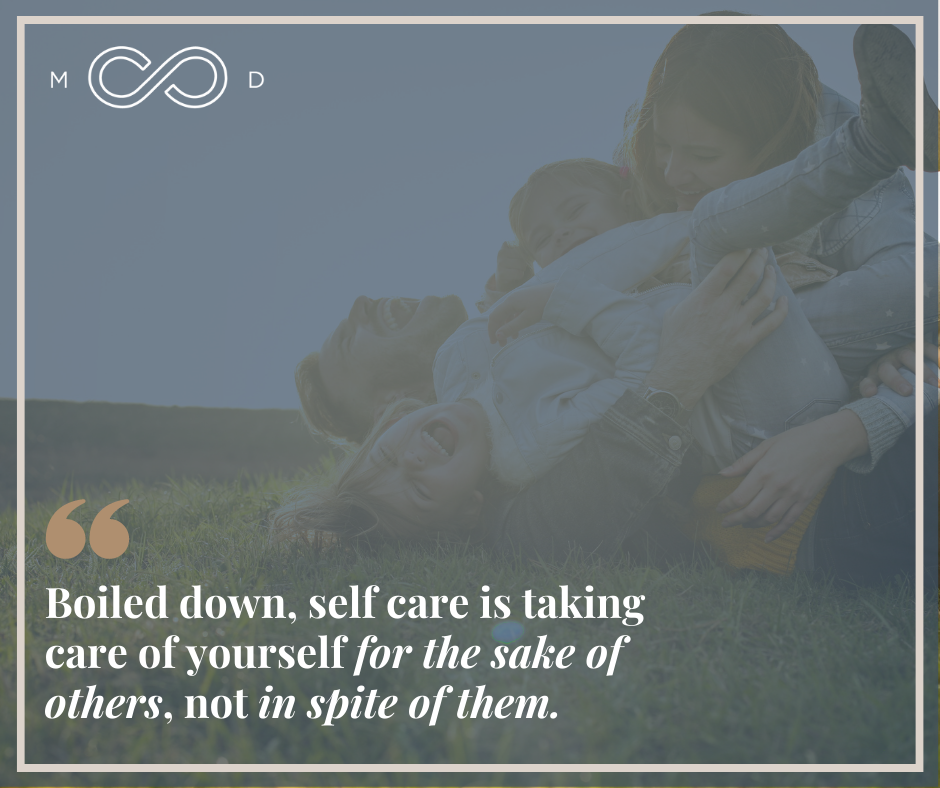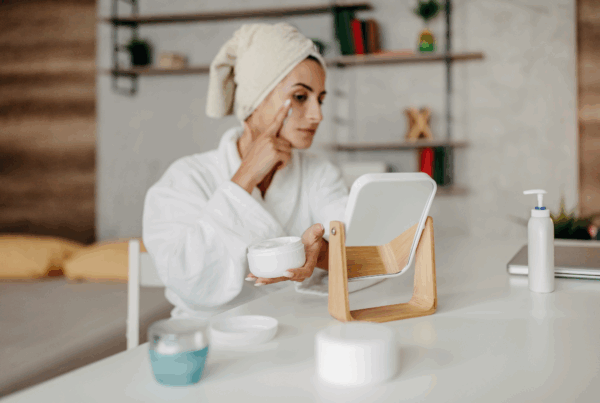We’ve all heard that a certain level of self care is important. But if we’re honest, we have to admit we don’t always do it.
Why is that?
For one thing, self care and health maintenance often require a challenging investment of time, finances, energy, and/or attention. Further, self care can be isolating. To exercise, you may have to take time from other activities — family, hobbies, or work — to get to the gym. Or your health goals may require a different nutritional plan than your spouse.
So while we may understand the importance of taking care of our mental and physical health, dedicating the time and effort for self care can feel selfish.
Let’s talk more about selfishness vs. self care, and the importance of knowing the difference.
Selfishness vs. Self Care
Viewed in a vacuum, a lot of self-care behaviors can appear selfish to others, or they may cause us to feel guilty ourselves. But does that mean self care is selfish?
Absolutely not.
Breaking down selfishness vs. self care is hugely important, and it largely comes down to motivation. What is motivating your self-care decisions?
Here’s how I differentiate between what is self care and what is selfish:
- Selfishness — Our desire or outcome both originates and ends with ourselves. We have a goal to do something, and we are the end point. If others have to sacrifice to make it happen, so be it.
- Self Care — Taking care of ourselves in order to be the best version of ourselves in all areas of our life, including work, community, and family. Our improvement benefits us, yes, but it also benefits others.
Boiled down, self care is taking care of yourself for the sake of others, not in spite of them.
Why Self Care Isn’t Selfish
Selfishness takes from resources in order to benefit you. While self care may also take from resources, it functions to improve yourself in order to benefit all those around you.
This is one of the most important reasons to differentiate selfishness from self care. In many settings, people mistakenly feel that investing the resources to care for their physical or mental well-being is selfish. They feel that those resources (time, attention, money, etc.) should be spent elsewhere, and they’re doing others a disservice by expending any on themselves.
But self care isn’t selfish. In fact, it makes you better at whatever you were doing in the first place.
Parenting
Parents notoriously experience guilt for sacrificing any time with their children.
It can be hard to take yourself out of the home. You’re needed there, and perhaps that’s where you want to be. You may also feel like your value and purpose are in the home.
Consequently, leaving to go to the gym may feel selfish. This is where it’s important to remember that the benefit to yourself is for others.
When you leave the home to exercise, it produces a great benefit to your person. That benefit comes back into the home with you, creating a better version of you as a parent than if you’d stayed home and spent all your time with the kids.
Work
Self care is important for your professional life as well. If you take care of yourself to maintain your purpose, attention, and health, you’re able to be a more productive worker in the job setting.
The age of connectivity we live in can lead to distractions and inefficiencies in many areas of our lives.
If you’re always available and always connected, that often interferes with sleep. This has a domino effect — the next day, you won’t be as clear-minded and focused because you’re a little sleep deprived. Losing sleep can even compound over time, eventually producing significant health effects that will affect more than just your concentration in a meeting.
If you prioritize sleep and deliberately disconnect for your evening downtime, you’re able to get better quality sleep. The next day, you’re more focused, attentive, energetic and a much better worker.
Many hard-working people can feel guilty for disconnecting from the job. But being available isn’t always valuable. Consider that taking 10 minutes away from a work activity tonight will give you an hour of better production tomorrow. It’s a cost/benefit analysis with the investment of your time.
Relationships
If you aren’t taking care of yourself in a significant relationship, such as a husband/wife relationship, it’s possible for negative emotions like resentment, guilt, and lack of enthusiasm to creep in.
Adequately investing in that relationship includes responsibly caring for ourselves — because we’re a piece of that relationship. This is immensely important.
Whether something is selfishness or self care, from the outside, can be very much subject to opinion. So, whether I’m treating an individual or a couple, I emphasize the importance of communicating the purpose of your action.
In a marriage, if you communicate about your actions in a way that helps the other person understand the motive and purpose behind your self care, you’re going to see a mutual benefit. Make sure those words are spoken. Don’t leave them to be interpreted incorrectly.
For example, communicate to your partner: I’m going to get a gym membership this year, and the purpose is so that I can be more attentive and healthy and give more to the family.
The same goes for nutritional choices. Say: I’m going to start ordering something different from that restaurant we love. I’m not doing it to make you feel guilty or feel like you have to make a different choice. I’m doing it for me, and the purpose is so I can be healthier for our relationship and our family.
Areas of Self Care
Though we’ve touched on some in the examples above, I want to take the time to identify the crucial areas for self care that will make the greatest impact both on you and all those around you.
Stress
If we don’t actively manage stress, we’ll find ourselves distracted in all areas of our life. Our productivity suffers. Our relationships suffer.
But when we actively manage stress through meditation, exercise, therapy, etc., we can reverse the process and become more energetic, attentive, and focused.
Exercise
Without exercise, you’re less energetic throughout the day. I often focus on how exercise plays into self respect with my patients. It’s an active investment in their health, which can bring tangible results to how they feel about themselves.
Establishing a regular routine where you’re moving throughout the day is going to give you improved strength and stamina, but also improved mood, self image, and self respect.
Nutrition
Your nutrition also affects your energy, which in turn affects your participation in every relationship and activity throughout your day. What you eat also affects weight, mood, and long-term health. Making healthy dietary choices will help fuel you to be the best version of yourself both now and in the future.
Sleep
As we discussed in our example above, sleep is vital to productivity. It also regulates mood and memory, and allows your body time to heal and rejuvenate.
Skimping on sleep may feel like a good use of time, but it ends up sacrificing the very things that contribute to your success at work and happiness in relationships — not to mention your physical health.
Relational and Spiritual
Your relational and spiritual health have a lot to do with this question: Where do you put your attention?
Where you put your attention and energy is important. What do you read or watch? What do you physically do? What conversations are you having? Are you dating your spouse and maintaining that intimacy?
It’s important to take stock of where we put our attention and energy. Then we can make a plan to improve our relational and spiritual health by intentionally putting our eyes and efforts on the things that will make a positive impact.
Make Self Care Intentional
I think we all recognize that if you don’t have an active plan, you end up defaulting to the status quo. That may be fair-to-middling, but it’s not wonderful. This is where the intentional behaviors in all these areas of self care prove so beneficial.
Self care isn’t selfish. Self care means bettering yourself for the benefit of others, not at their expense. It brings out the best version of yourself.
You become the best version of you at home, at work, and in your community — and that’s worth investing in.

Dr. Wright joined Brentwood MD in 2022 as the model allows him to spend more time connecting with patients and build a foundation of exceptional care. He is a Nashville native and completed his family medicine residency at the University of Tennessee Health Science Center, where he also served as Chief Resident. He believes that your health deserves a prominent position on your priority list, and would be honored to serve you and your family.








